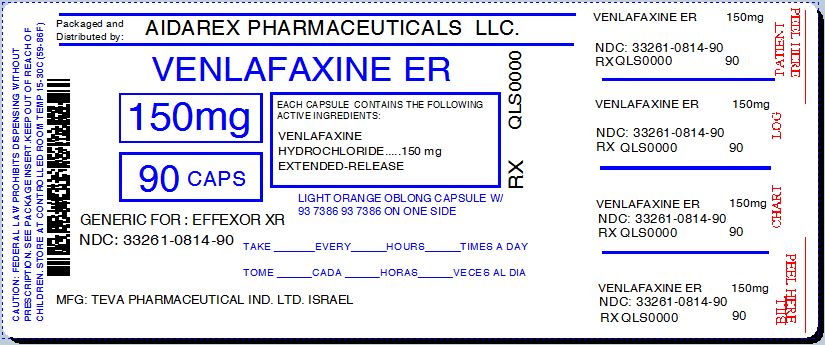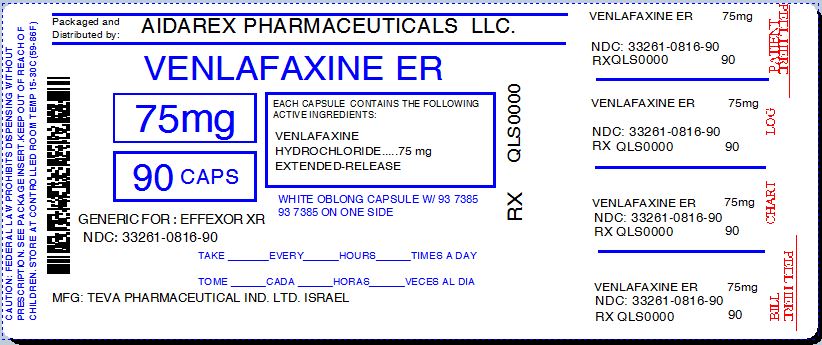Do you know that important immune protective proteins are present in breast milk? Breast milk also contains required vitamins, minerals, saturated and un saturated fats. These things are extremely important for development of healthy brain. If you are taking any medicine for short term or for the chronic reason then that passes in breast milk as well, that is why you should always check the drug with your health care provider. Here at DrLact we try to analyze drugs based on available researches and in this sheet we will present our analysis for Venlafaxine Hydrochloride Capsule, Extended Release.
What is Venlafaxine Hydrochloride Capsule, Extended Release used for?
Major Depressive Disorder Venlafaxine Hydrochloride Extended-Release Capsules USP are indicated for the treatment of major depressive disorder. The efficacy of Venlafaxine Hydrochloride Extended-Release Capsules USP in the treatment of major depressive disorder was established in 8 and 12 week controlled trials of adult outpatients whose diagnoses corresponded most closely to the DSM-III-R or DSM-IV category of major depressive disorder (see Clinical Trials). A major depressive episode (DSM-IV) implies a prominent and relatively persistent (nearly every day for at least 2 weeks) depressed mood or the loss of interest or pleasure in nearly all activities, representing a change from previous functioning, and includes the presence of at least five of the following nine symptoms during the same two-week period: depressed mood, markedly diminished interest or pleasure in usual activities, significant change in weight and/or appetite, insomnia or hypersomnia, psychomotor agitation or retardation, increased fatigue, feelings of guilt or worthlessness, slowed thinking or impaired concentration, a suicide attempt or suicidal ideation. The efficacy of Venlafaxine Hydrochloride Tablets USP (immediate release) in the treatment of major depressive disorder in adult inpatients meeting diagnostic criteria for major depressive disorder with melancholia was established in a 4 week controlled trial (see Clinical Trials). The safety and efficacy of Venlafaxine Hydrochloride Extended-Release Capsules USP in hospitalized depressed patients have not been adequately studied. The efficacy of Venlafaxine Hydrochloride Extended-Release Capsules USP in maintaining a response in major depressive disorder for up to 26 weeks following 8 weeks of acute treatment was demonstrated in a placebo-controlled trial. The efficacy of Venlafaxine Hydrochloride Tablets USP (immediate release) in maintaining a response in patients with recurrent major depressive disorder who had responded and continued to be improved during an initial 26 weeks of treatment and were then followed for a period of up to 52 weeks was demonstrated in a second placebo-controlled trial (see Clinical Trials). Nevertheless, the physician who elects to use Venlafaxine Hydrochloride Tablets USP/Venlafaxine Hydrochloride Extended-Release Capsules USP for extended periods should periodically re-evaluate the long-term usefulness of the drug for the individual patient (see DOSAGE AND ADMINISTRATION). Panic Disorder Venlafaxine Hydrochloride Extended-Release Capsules USP are indicated for the treatment of panic disorder, with or without agoraphobia, as defined in DSM-IV. Panic disorder is characterized by the occurrence of unexpected panic attacks and associated concern about having additional attacks, worry about the implications or consequences of the attacks, and/or a significant change in behavior related to the attacks. Panic disorder (DSM-IV) is characterized by recurrent, unexpected panic attacks, i.e., a discrete period of intense fear or discomfort, in which four (or more) of the following symptoms develop abruptly and reach a peak within 10 minutes: 1) palpitations, pounding heart, or accelerated heart rate; 2) sweating; 3) trembling or shaking; 4) sensations of shortness of breath or smothering; 5) feeling of choking; 6) chest pain or discomfort; 7) nausea or abdominal distress; 8) feeling dizzy, unsteady, lightheaded, or faint; 9) derealization (feelings of unreality) or depersonalization (being detached from oneself); 10) fear of losing control; 11) fear of dying; 12) paresthesias (numbness or tingling sensations); 13) chills or hot flushes. The efficacy of Venlafaxine Hydrochloride Extended-Release Capsules USP in the treatment of panic disorder was established in two 12 week placebo-controlled trials in adult outpatients with panic disorder (DSM-IV). The efficacy of Venlafaxine Hydrochloride Extended-Release Capsules USP in prolonging time to relapse in panic disorder among responders following 12 weeks of open-label acute treatment was demonstrated in a placebo-controlled study (see CLINICAL PHARMACOLOGY, Clinical Trials). Nevertheless, the physician who elects to use Venlafaxine Hydrochloride Extended-Release Capsules USP for extended periods should periodically re-evaluate the long-term usefulness of the drug for the individual patient (see DOSAGE AND ADMINISTRATION).
Is using Venlafaxine Hydrochloride Capsule, Extended Release unsafe in breastfeeding? Can there be bad consequences for baby if I use it while breastfeeding?
Venlafaxine is the only one ingredient used in manufacturing of Venlafaxine Hydrochloride Capsule, Extended Release, Which makes it easier to analyze its effect in breastfeeding. As per our analysis of Venlafaxine it is safe to use Venlafaxine Hydrochloride Capsule, Extended Release while lactating. We suggest you to check further details below about Venlafaxine usage in breastfeeding.
Statement of Manufacturer/Labeler about breastfeeding usage
Nursing Mothers Venlafaxine and ODV have been reported to be excreted in human milk. Because of the potential for serious adverse reactions in nursing infants from venlafaxine hydrochloride extended-release capsules, a decision should be made whether to discontinue nursing or to discontinue the drug, taking into account the importance of the drug to the mother.
Venlafaxine Hydrochloride Capsule, Extended Release Breastfeeding Analsys
SafeCAS Number: 93413-69-5
It is a reuptake-inhibitor of Serotonin and Norepinephrine, and a precursor of Desvenlafaxine. Excreted into breast milk in amounts that may be clinically significant, which has been found in the plasma of breastfed infants from treated mothers. However, side-effects in those infants have not been shown. Various studies failed to show short or long-term side-effects among infants whose mothers were on Venlafaxine, both on physical or psychomotor development. It may induce galactorrhea. The poor extrauterine adaptation that may appear in neonates just after birth when the pregnant woman has been treated with selective reuptake-inhibitors of Serotonin like Venlafaxine or Mirtazapine, is seen to be mild if the baby is breastfed. In the case report of a mother who was taking this medication during pregnancy, her infant had shown amelioration of symptoms due to Abstinence Syndrome after having been breastfed. Women who use antidepressant medication during pregnancy are in need of more support for breastfeeding since they are at risk for early weaning.
Venlafaxine Hydrochloride Capsule, Extended Release Breastfeeding Analsys - 2
CAS Number: 93413-69-5

Infants receive venlafaxine and its active metabolite in breastmilk, and the metabolite of the drug can be found in the plasma of most breastfed infants; however, concurrent side effects have rarely been reported. Breastfed infants, especially newborn or preterm infants, should be monitored for excessive sedation and adequate weight gain if this drug is used during lactation, possibly including measurement of serum levels of desvenlafaxine (O-desmethylvenlafaxine), to rule out toxicity if there is a concern. However, newborn infants of mothers who took the drug during pregnancy may experience poor neonatal adaptation syndrome as seen with other antidepressants such as SSRIs or SNRIs. Use of venlafaxine during breastfeeding has been proposed as a method of mitigating infant venlafaxine withdrawal symptoms,[1][2] but this has not been rigorously demonstrated.
I already used Venlafaxine Hydrochloride Capsule, Extended Release and meanwhile I breastfed my baby should I be concerned?
As usage of Venlafaxine Hydrochloride Capsule, Extended Release is mostly safe while breastfeeding hence there should not be any concern. In case of any change in behavior or health of your baby you should inform your health care provider about usage of Venlafaxine Hydrochloride Capsule, Extended Release else no further action is required.
My health care provider has asked me to use Venlafaxine Hydrochloride Capsule, Extended Release, what to do?
Usage of Venlafaxine Hydrochloride Capsule, Extended Release is safe for nursing mothers and baby, No worries.
If I am using Venlafaxine Hydrochloride Capsule, Extended Release, will my baby need extra monitoring?
No
Who can I talk to if I have questions about usage of Venlafaxine Hydrochloride Capsule, Extended Release in breastfeeding?
US
National Womens Health and Breastfeeding Helpline: 800-994-9662 (TDD 888-220-5446) 9 a.m. and 6 p.m. ET, Monday through Friday
UK
National Breastfeeding Helpline: 0300-100-0212 9.30am to 9.30pm, daily
Association of Breastfeeding Mothers: 0300-330-5453
La Leche League: 0345-120-2918
The Breastfeeding Network supporter line in Bengali and Sylheti: 0300-456-2421
National Childbirth Trust (NCT): 0300-330-0700
Australia
National Breastfeeding Helpline: 1800-686-268 24 hours a day, 7 days a week
Canada
Telehealth Ontario for breastfeeding: 1-866-797-0000 24 hours a day, 7 days a week
Drug Brands with same Active ingredients



